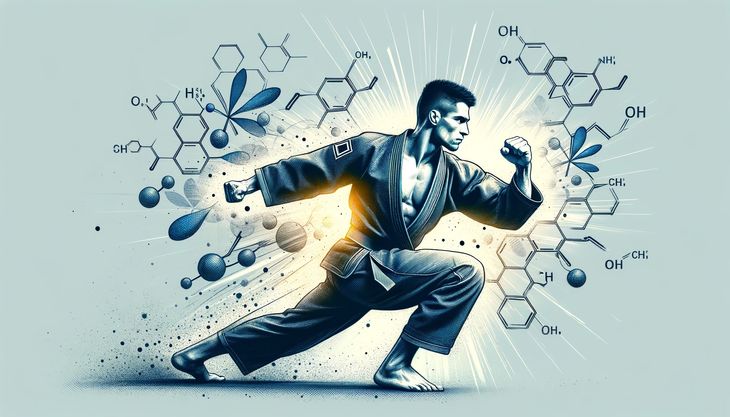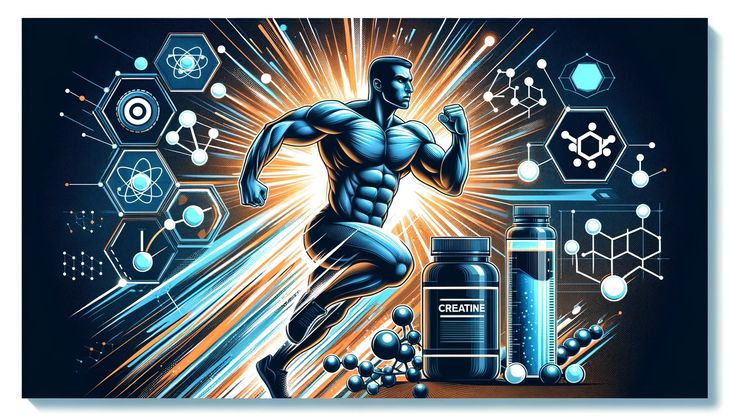The Key Benefits of Creatine Supplementation for Athletes

Creatine, a naturally occurring compound found in foods like red meat, plays an essential role in energy production within muscle cells.
Creatine enhances energy production by increasing the availability of adenosine triphosphate (ATP), the human body's primary energy molecule. During high-intensity exercise, creatine donates a phosphate group to adenosine diphosphate (ADP) to rapidly regenerate ATP*, thereby sustaining energy levels and improving exercise performance.
Its popularity as a dietary supplement has been bolstered by numerous studies affirming its ergogenic effects, particularly in individual and team sports that demand high-intensity exercise capacity. Creatine supplementation can promote significant changes in power output, recovery time, and lean muscle mass, making it a favoured choice for those seeking to enhance their physical performance and reap the positive effects of creatine loading.
Football Players and the Benefits of Creatine Supplementation
On average, elite football players run 8–12 kilometres per match and are involved in up to 250 high-intensity actions, like sprinting, jumping, and changing direction.
For such actions, anaerobic processes are required. In the context of football, the “gold standard” assessment of anaerobic power is the Wingate test, for which athletes pedal as fast as they can for 30 seconds on a cycle erg.
A meta-analysis** by researchers in Spain (1) revealed that, compared to a placebo, creatine led to significant improvements on the Wingate test among football players, highlighting the supplement’s capacity to enhance anaerobic metabolism.
How football players can benefit from supplements is also touched on in our article comparing creatine and l-carnitine.
Martial Artists and the Benefits of Creatine Supplementation
Explosiveness is key in martial arts, and in forms that prioritise kicking, such as Taekwondo, explosive legs are especially important.

One measure of leg anaerobic power is the vertical leap test. To see if creatine supplementation improves vertical leap among martial artists, researchers in Canada (2) had Taekwondo practitioners complete the test, then had one group take 20 grams of maltodextrin (placebo) for six days and another group take 20 grams of a creatine supplement for the same duration. On the seventh day, vertical leap was tested again.
Compared to the placebo group, the creatine group exhibited significantly greater improvements in vertical leap, suggesting creatine can facilitate rapid gains in leg anaerobic power.
Rugby Players and the Benefits of Creatine Supplementation
As well as strength, rugby players, who typically cover 7 kilometres per match, require exceptional fitness.
One concern associated with creatine is that it will lead to increases in mass, thereby decreasing performance on fitness tests. In one study published in Applied Physiology, Nutrition, and Metabolism (3), rugby players completed tests of muscular endurance—number of reps on bench and leg press at 75% of max—and aerobic endurance, assessed by a shuttle-run test (aka beep test). After 8 weeks of creatine or placebo, they were tested again. In comparison to the placebo group, greater improvements in bench and leg press were seen in the creatine group, though there were no between-group differences on the shuttle-run test.
These results indicate that creatine supplementation can enhance strength without compromising fitness.
Swimmers and the Benefits of Creatine Supplementation
Besides performance, creatine can assist with rehabilitation.
Among swimmers, overuse injuries are common in the flexor hallucis longus muscle, a posterior lower leg muscle that attaches to the big toe. In a study published in the Journal of Sports Science and Medicine (4), swimmers with overuse injuries affecting this muscle received physiotherapy along with either creatine (5 grams, four times per day) or a placebo.
After 2 weeks, those in the creatine group, compared to the placebo group, had significantly higher ankle plantar flexion peak torque (think calf press) and reported less pain.
Powerlifters and the Benefits of Creatine Supplementation
In view of the above results, it’s not surprising that creatine can benefit strength athletes.

Researchers in South Africa (5) asked experienced powerlifters to complete leg extensions and deadlifts before and after 5 days of either creatine (9 grams per day) or placebo.
Relative to the placebo group, the creatine group showed greater improvements in peak torque and average power on leg extension, as well as in their one-rep-max deadlift.
Endurance Athletes and the Benefits of Creatine Supplementation
As well as for those whose main focus is resistance training and short-duration exercise, research has explored the efficacy of creatine supplementation for those engaged in endurance sports.
Cyclists
A study published in the International Journal of Sport Nutrition and Exercise Metabolism (6) investigated the effects of creatine supplementation on blood lactate levels in endurance cyclists.
The study included 13 male subjects who underwent a maximal incremental cycling test before and after a six-day creatine supplementation regimen (20 grams per day). The results demonstrated that creatine significantly reduced lactate concentrations during exercise, suggesting improved lactate threshold.
This indicates that creatine supplements may enhance endurance performance in cyclists by reducing lactate accumulation and possibly increasing time to exhaustion during high-intensity cycling.
Rowers
A study published in the International Journal of Sport Nutrition and Exercise Metabolism (7) evaluated the effects of creatine supplementation on elite rowers.
It involved 16 male athletes who were divided into two groups: one receiving 20 grams of creatine per day and the other a placebo over a period of five days. The study measured the athletes' performance in both aerobic and anaerobic exercises before and after supplementation.
The results indicated that creatine supplementation improved the lactate threshold and extended the time to exhaustion during anaerobic exercise.
Runners
In a study published in the European Journal of Nutrition (8), twelve male athletes participated in endurance and sprint running trials before and after a 15-day regimen of 12 grams of creatine monohydrate per day. The results showed significant decreases in muscle glycogen and protein degradation post-endurance exercise with creatine supplementation. This suggests creatine may play a role in improving energy production and reducing muscle breakdown during prolonged exercise.

A similar study (9) examined the effects of creatine supplementation on markers of muscle injury in endurance runners.
Thirty-four male athletes participated, receiving either 20g of creatine monohydrate or a placebo daily for five days before a 30km race. The study assessed muscle soreness and inflammation markers, such as creatine kinase and lactate dehydrogenase.
The results showed that creatine supplementation attenuated the increase in these markers post-race, suggesting a protective effect against muscle damage.
Triathletes
A study published in the European Journal of Applied Physiology (10) investigated the effect of short-term creatine supplementation on endurance triathletes.
It involved eight male Ironman triathletes, who were either given a placebo or supplemented with creatine monohydrate (20 grams per day) for five days before the competition. The study measured various markers of muscle and liver injury before and after the competition.
The results indicated that creatine supplementation led to a less pronounced increase in markers of muscle and liver injury post-competition, suggesting a protective effect against muscle damage in endurance triathletes.
Female Athletes and the Benefits of Creatine Supplementation
Despite the clear evidence of the beneficial effects of creatine supplementation, a study published in the Clinical Journal of Sport Medicine (11) found that only 4% of female athletes within the top division of the United States National Collegiate Athletic Association (NSAA) took creatine (compared to 48% of males).

Creatine supplementation offers several potential benefits for women, including enhanced strength, improved endurance, and better post-exercise recovery. Creatine can also aid muscle growth and leaner body composition and has potential cognitive benefits like improved memory.
Women, who naturally have lower creatine stores, may find supplementation particularly beneficial during hormonal changes such as pregnancy and menopause.
Young Athletes and the Benefits of Creatine Supplementation
A review published in 2018 in Frontiers in Nutrition underscores the substantial body of research affirming creatine's safety and efficacy as a dietary supplement, particularly in enhancing exercise performance through increased power output and recovery from intense exercise. While the research in adolescent populations is limited, studies indicate positive effects without significant adverse events, suggesting that creatine can be an effective supplement for young athletes engaged in high-intensity sports or strength training. It highlights that creatine is a naturally occurring compound (e.g., it is found in foods like red meat, salmon, and chicken***), and when administered in controlled doses, it supports increases in lean muscle mass without negative impacts on body weight or health.
However, a study published in Medicine & Science in Sports & Exercise after the above review highlights potential adverse effects for young athletes. The study evaluated the safety and efficacy of creatine supplementation on lung health in youth elite soccer players and involved a double-blind, placebo-controlled trial where participants were administered creatine monohydrate over eight weeks. The results indicated mild unfavourable changes in airway inflammation markers post-supplementation. Thus, the study suggests the need for caution and further research on the respiratory effects of creatine in young athletes, particularly for those with underlying allergies.
Health Conditions and the Benefits of Creatine Supplementation
As well as in healthy people, creatine supplementation has been studied in clinical trials for its potential benefits for individuals with health conditions, particularly those affecting older adults.
For instance, one study found that creatine could help maintain cognitive function in those suffering from sleep deprivation (12). For those with muscular dystrophy, creatine's ability to increase muscle strength and lean body mass may be beneficial (13), and there is emerging evidence that creatine supplementation could be of value to those with traumatic brain injury (14). Moreover, long-term supplementation could play an important role in injury prevention (15), and it could promote strength and endurance in those affected by heart disease (16).
While research has also investigated the potential advantages of creatine supplementation for amyotrophic lateral sclerosis and Parkinson's disease, the evidence of its benefits is limited (17, 18). Additionally, there is no strong evidence that creatine reduces oxidative stress (a physiological state associated with tissue damage), at least in older individuals (19).
Potential Side Effects of Creatine Supplementation
A widely cited review published in the Journal of the International Society of Sports Nutrition (j int soc sports nutr) concludes that creatine monohydrate is safe across various populations, from infants to the elderly, and offers therapeutic benefits for both healthy and diseased individuals. The authors also say that no evidence suggests significant adverse effects from short or long-term use, even at high dosages (20). Although there have also been concerns about whether creatine use may entail adverse effects on kidney function, a meta-analysis published in the Journal of Renal Nutrition concludes that taking creatine does not lead to kidney damage or kidney disease (21).
However, a study published in the Journal of Athletic Training found that, compared to those in a control group, those taking creatine experienced significantly greater water retention and, therefore, greater weight gain (22).
How Much Creatine Should Athletes Take?
The amount of creatine administered to athletes in the above studies varies quite substantially, though it is typically in the range of 5 to 20 grams per day. How much an individual should take will depend on factors like their weight and dietary consumption of creatine. For instance, a lighter individual who gets a lot of creatine from foods (e.g., herring and beef have about 1 gram of creatine per 100 grams) may want to stick towards the lower end of this range, whereas a heavier individual who doesn't eat a lot of creatine-rich foods may want to aim for the higher end of the range.
Final Words on the Benefits of Creatine Supplementation
Creatine supplementation stands as a popular supplement among professional athletes and other healthy individuals due to its potential to improve high-intensity exercise performance and aid recovery. Despite concerns regarding drug administration in younger populations, controlled doses of creatine have been shown to be safe, with no significant adverse effects reported in the majority of studies. While high doses during the loading phase could lead to small amounts of weight gain due to water retention, the overall consensus supports the efficacy and safety of creatine, underscoring its role as a valuable addition to the dietary regimen of athletes.

If you enjoyed this article, you might also like this one on the benefits of BCAAs for different athletes or these ones the best supplements for growing muscle as an older adult, the best supplements for those over 40, the best supplements for recovery, comparing creatine pills and powders, comparing creatine with glutamine, comparing creatine with whey protein and comparing creatine with BCAAs. If you're interested in other dietary supplements (e.g., amino acids), we also have articles about how supplements are used by the strongest men in the world, like Mark Felix, Martins Licis and Mitchell Hooper, as well as by actors who have played superheroes.
About the Author
Dave Robinson, a co-founder of ukfitness.pro, has a background in psychology (BSc) and neuroscience (MSc, PhD). As well as strength training, he enjoys endurance challenges and has run ultramarathons, cycled across several countries, and completed the Three Peaks Challenge. When writing, he draws on scientific evidence to understand the pros and cons of different diets, supplements, and training regimes.
References
1. Mielgo-ayuso, J., Calleja-gonzalez, J., & Marqu, D. (2019). Effects of creatine supplementation on athletic performance in soccer players: a systematic review. Nutrients, 11(757), 1–17.
2. Kazemi, M., Hashemvarzi, S. A., & Mohammadi, Z. F. (2013). The combined effect of creatine and sodium bicarbonate supplementation on blood lactate and anaerobic power in young taekwondo players. International Journal of Sport Studies, 3(9), 963–969
3. Chilibeck, P. D., Magnus, C., & Anderson, M. (2007). Effect of in-season creatine supplementation on body composition and performance in rugby union football players. Applied Physiology, Nutrition, and Metabolism, 1057, 1052–1057.
4. Juhasz, I., Kopkane, J. P., Hajdo, P., Szalay, G., Kopper, B., & Tibanyi, J. (2018). Creatine supplementation supports the rehabilitation of adolescent fin swimmers in tendon overuse injury cases. Journal of Sports Science and Medicine, 17(April), 279–288.
5. Rossouw, F., Krüger, P. E., & Rossouw, J. (2000). The effect of creatine monohydrate loading on maximal intermittent exercise and sport-specific strength in well trained power-lifters. Nutrition Research, 20(4), 505–514.
6. Oliver, J. M., Joubert, D. P., Martin, S. E., & Crouse, S. F. (2013). Oral creatine supplementation's decrease of blood lactate during exhaustive, incremental cycling. International Journal of Sport Nutrition and Exercise Metabolism, 23(3), 252–258.
7. Chwalbiñska-Moneta J. (2003). Effect of creatine supplementation on aerobic performance and anaerobic capacity in elite rowers in the course of endurance training. International Journal of Sport Nutrition and Exercise Metabolism, 13(2), 173–183.
8. Tang, F. C., Chan, C. C., & Kuo, P. L. (2014). Contribution of creatine to protein homeostasis in athletes after endurance and sprint running. European Journal of Nutrition, 53(1), 61–71.
9. Santos, R. V. T., Bassit, R. A., Caperuto, E. C., & Costa Rosa, L. F. B. P. (2004). The effect of creatine supplementation upon inflammatory and muscle soreness markers after a 30km race. Life Sciences, 75(16), 1917-1924.
10. Bassit, R. A., Pinheiro, C. H., Vitzel, K. F., Sproesser, A. J., Silveira, L. R., & Curi, R. (2010). Effect of short-term creatine supplementation on markers of skeletal muscle damage after strenuous contractile activity. European Journal of Applied Physiology, 108(5), 945–955.
11. LaBotz, M., & Smith, B. W. (1999). Creatine supplement use in an NCAA Division I athletic program. Clinical journal of sport medicine : official journal of the Canadian Academy of Sport Medicine, 9(3), 167–169.
11. McMorris, T., Harris, R. C., Swain, J., Corbett, J., Collard, K., Dyson, R. J., Dye, L., Hodgson, C., & Draper, N. (2006). Effect of creatine supplementation and sleep deprivation, with mild exercise, on cognitive and psychomotor performance, mood state, and plasma concentrations of catecholamines and cortisol. Psychopharmacology, 185(1), 93–103.
12. Kley, R. A., Tarnopolsky, M. A., & Vorgerd, M. (2013). Creatine for treating muscle disorders. The Cochrane database of systematic reviews, 2013(6), CD004760.
13. Dolan, E., Gualano, B., & Rawson, E. S. (2019). Beyond muscle: the effects of creatine supplementation on brain creatine, cognitive processing, and traumatic brain injury. European journal of sport science, 19(1), 1–14.
14. Hall, M., Manetta, E., & Tupper, K. (2021). Creatine Supplementation: An Update. Current sports medicine reports, 20(7), 338–344.
15. Gordon, A., Hultman, E., Kaijser, L., Kristjansson, S., Rolf, C. J., Nyquist, O., & Sylvén, C. (1995). Creatine supplementation in chronic heart failure increases skeletal muscle creatine phosphate and muscle performance. Cardiovascular research, 30(3), 413–418.
16. Mo, J. J., Liu, L. Y., Peng, W. B., Rao, J., Liu, Z., & Cui, L. L. (2017). The effectiveness of creatine treatment for Parkinson's disease: an updated meta-analysis of randomized controlled trials. BMC neurology, 17(1), 105.
17. Rosenfeld, J., King, R. M., Jackson, C. E., Bedlack, R. S., Barohn, R. J., Dick, A., Phillips, L. H., Chapin, J., Gelinas, D. F., & Lou, J. S. (2008). Creatine monohydrate in ALS: effects on strength, fatigue, respiratory status and ALSFRS. Amyotrophic lateral sclerosis: official publication of the World Federation of Neurology Research Group on Motor Neuron Diseases, 9(5), 266–272.
18. Amiri, E., & Sheikholeslami-Vatani, D. (2023). The role of resistance training and creatine supplementation on oxidative stress, antioxidant defense, muscle strength, and quality of life in older adults. Frontiers in public health, 11, 1062832.
19. Kreider, R. B., Kalman, D. S., Antonio, J., Ziegenfuss, T. N., Wildman, R., Collins, R., Candow, D. G., Kleiner, S. M., Almada, A. L., & Lopez, H. L. (2017). International Society of Sports Nutrition position stand: safety and efficacy of creatine supplementation in exercise, sport, and medicine. Journal of the International Society of Sports Nutrition, 14, 18.
20. de Souza E Silva, A., Pertille, A., Reis Barbosa, C. G., Aparecida de Oliveira Silva, J., de Jesus, D. V., Ribeiro, A. G. S. V., Baganha, R. J., & de Oliveira, J. J. (2019). Effects of Creatine Supplementation on Renal Function: A Systematic Review and Meta-Analysis. Journal of renal nutrition , 29(6), 480–489.
21. Powers, M. E., Arnold, B. L., Weltman, A. L., Perrin, D. H., Mistry, D., Kahler, D. M., Kraemer, W., & Volek, J. (2003). Creatine Supplementation Increases Total Body Water Without Altering Fluid Distribution. Journal of athletic training, 38(1), 44–50.
*Specifically, creatine phosphate donates a phosphate group to ADP. Before it is phosphorylated, creatine is referred to as "free creatine".
**A meta-analysis involves analysing data from multiple relevant studies. Among study designs, it is often viewed as being at the top of the "hierarchy of evidence" by scientists and bodies (e.g., the International Olympic Committee) that consider whether supplements like creatine should be permitted in certain sports in light of evidence relating to their safety and potential influence on sports performance.
***About half of the creatine in our bodies comes from sources like these, and the rest is synthesised from amino acids in the liver, kidney, and pancreas.